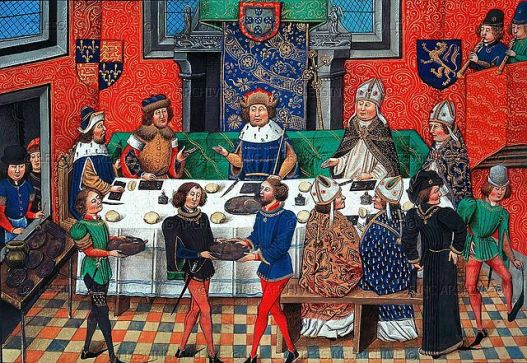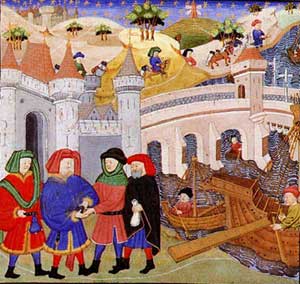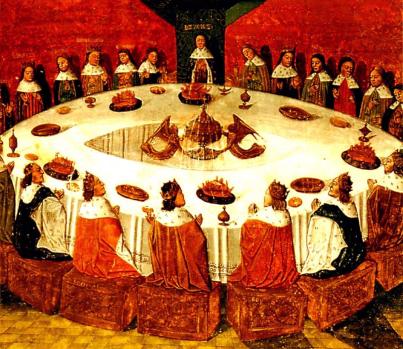
In the past two years, propaganda of national unity has become a distinct feature of Russia’s political landscape. Everyone, from migrant workers to Putin’s oligarch friends, must show their patriotism on every occasion. Propaganda claims that during hard times Russians have always “rallied around the flag”, and refers to historic examples to prove this point. The biggest example is the Great Patriotic War (this is what WW2 is called in Russia). But there are other examples. For instance, when I was in Moscow last winter and visited a municipal service, I saw there a poster of Minin and Pozharsky. Wikipedia tells us that in the 17th century, Prince Dmitry Pozharsky and citizen Kuzma Minin “gathered and all-Russian volunteer army and expelled the forces of the Polish-Lithuanian Commonwealth from Moscow”. So what the author of the poster likely meant (mind you, this was before the Ukraine crisis) was that since Russia was again surrounded by enemies, its citizens had to forget about their disagreements and unite.
As we have seen in the past months, this propaganda campaign is quite successful. Neither the deaths of Russian soldiers in Ukraine, nor the recent passing of the first draft of the “Rotenberg Bill” by Russian Parliament have swayed public opinion in Russia. In fact, Alexey Navalny discovered this a long time ago – while Russians tend to complain about corruption and inequality, they are definitely unwilling to revolt. What are the reasons for this apathy?
Much has been said about the success of Putin’s propaganda machine, but I have always thought about the average Russian’s tolerance of Putin’s escapades as a function of economic growth. Indeed, economic data suggests there might be a connection. Here is an example of such data: a chart showing the annual growth in Russian households’ mean disposable income based on surveys by the Russian Statistics Service. Since I like to compare Russia to other countries, I supplemented that chart with a similar chart for the US, based on US Census Bureau data. Strictly speaking, Russian statistics shouldn’t be compared to US statistics directly because the methods of data collection and analysis are different; however, this is not a research paper so I decided to put these charts side by side. The data are provided for 2004-2013, not adjusted for inflation; they are broken down into quintiles.

Sources: Russian Statistics Service (2004-2013), US Census Bureau (2013)
We can see three important trends in the Russian data. One, in the period between 2004 and 2013 Russian households’ disposable incomes grew at an average rate of 19% per year. As a result, in 10 years the incomes of the highest 20% went up by 430% while the incomes of the rest grew by over 330%. These rates are astonishingly high. Two, in the wake of the 2008 crisis this income growth slowed down, but the highest 20% was affected more than for the rest. Three, after 2009 the incomes of the highest 20% grew faster than those of the rest.
As for the US data, there is a clear growth trend but it’s more modest; on average, household incomes grew by only 2% per year (compared to Russia’s 19%). This is not surprising, as the growth in Russia started from a much lower base. We also see that before the 2008 crisis US income growth in the highest 20% was less prominent than in the rest of the population. But the crisis impacted incomes in all categories much more than it did in Russia – the recession was much more prolonged. Then, after 2010 (and similarly to Russia), incomes in the highest 20% grew more than they did in the rest of the population – but the gap seems to be narrowing.
Using the same data, we can observe how the share of each quintile in the mean income in both countries changed during the same period.

Sources: Russian Statistics Service (2004-2013), US Census Bureau (2013)
Between 2004 and 2013 the share of the highest 20% in the Russian households’ mean disposable income growth increased from 45% to 49%, but the shares of the other four quintiles didn’t change as significantly. There were no major fluctuations between the shares of the five quintiles in total income during that period. And, of course, we should assume that social transfers helped those in the lowest quintiles adapt to the effects of inflation. As for the US, year-on-year changes in the share of the highest 20% in the US mean household income were less volatile than in Russia. Also, the share of the two lowest quintiles in overall income was lower in the US than in Russia. But overall, the picture is not that different and the trend is quite similar.
Finally, here’s a chart for the Gini Coefficient growth in both countries. The Gini Coefficient measures inequality from 0 (perfect equality) to 1 (perfect inequality). As a rule, it tends to be lower in the social democracies of Northern Europe and higher in emerging economies such as Russia, China or South Africa.

Sources: OECD (2014), Russian Statistics Service (2014)
In terms of the Gini Coefficient, Both Russia and the US are somewhere in the middle of the global inequality rankings but closer to their “inequal” tail. While in the past 10 years Russia clearly had a higher Gini Coefficient, the US experienced somewhat of a faster growth in inequality compared to Russia. However, more recently the Gini Coefficient continued to increase in Russia as it stabilized in the US.
To sum it up, if the data (and my quick interpretation of it) are accurate, Russia’s recent oil wealth is a tide that has literally lifted all the boats. Sure, it lifted the top ones more than it did the rest – but it did lift all of them. And it lifted many Russians out of poverty. In 2004-2013, economic growth was significantly higher in Russia compared to the US, and in spite of a high level of inequality most Russians likely saw a real improvement in the quality of life. Again, this analysis isn’t robust and there are multiple factors that have contributed to Russians’ perception of their leader. However, I witnessed this amazing growth in prosperity first-hand, so to me it’s clear that even with high inflation rates Russians benefited from a growth in their real incomes. Before 2014, while Russians in the lower quintiles had many reasons to complain about inequality, the net effect of Putin’s economic policies on their lives was positive.
Of course, today the situation is very different. We know that a slowdown in economic growth began even before the Ukraine crisis but the recession has undoubtedly worsened because of that crisis. In any case, it’s interesting to see how the events of 2014 have affected real incomes and inequality in Russia. Given that Putin has pretty much taken full responsibility for supporting the growing class of budgetniki (those employed by the state), today’s adverse economic climate with a near-zero growth, declining ruble rate, and capital flight may potentially result in the Russian state not being able to fulfill its obligations towards those who have hitherto approved of, or tolerated, Putin’s regime. What will then happen to the national unity?









